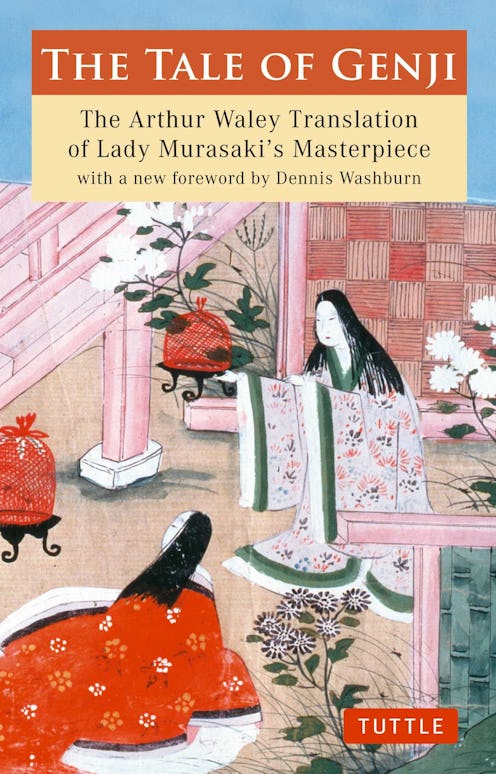Books
So, It Turns Out The First Novel Ever Was Written By A Woman

The word "novel" quite literally means "new." As in a "new story" or a "new way of writing." And while it's true that popular novels as we know them are fairly "new," the modern novel as an art form is actually quite old. There were more than a few proto-novels that popped up in Ancient Greece, Rome, and India; long-form stories that sort of came close to being book-length, and that dealt with a fictional character in fictional circumstances living their fictional life. But then came the Lady Murasaki Shikibu, in 11th Century Japan, to definitively kick off this whole novel thing with a fifty-four chapter self-insert fic called The Tale of Genji.
Murasaki was a noble lady-in-waiting to the empress, at a time when only men were permitted to write in the formal Chinese. Women were allowed to write in the more common Japanese, though, and Murasaki was a court poet. She and Sei Shōnagon, her sassy rival frenemy, would write stories and poems for the other noble ladies. But while Sei was busy with her pithy observations and pre-Twitter subtweets, Murasaki started spinning a tale in installments: a story about the beautiful Prince Hikaru Genji and his many loves and losses.
The Tale of Genji by Murasaki Shikibu, $14.06, Amazon
The premise of The Tale of Genji is that Genji, an incredibly hot prince, is stripped of his royal titles for political reasons. Now he'll have to pursue a lesser career as an imperial officer! But the story itself is almost entirely about Genji's love life, and his subsequent sadness over his love life. He does charming things like having an affair with his stepmom, cheating on his wife, having a secret baby with his stepmom, and kidnapping a 10-year-old girl so he can raise her to be his perfect woman (naturally, this young girl is also named Murasaki and grows up to be the mega hot love of Genji's life). To be fair to Genji, both men and women of the time were expected to sleep around, even while married. Wives and husbands didn't usually live together, and extra-marital sex wasn't a big deal. Genji is a perfect gentleman by the standards of Heian Era Japan.
By modern standards, Murasaki's novel is... problematic, to be sure — the plot reads a bit like Game of Thrones, but without any of the fantasy or the murder, and also people do things like wasting away from sorrow over a lost love. It's also difficult to keep track of Murasaki's many characters, since using anyone's actual name was seen as incredibly vulgar at court. To get around this, she referred to characters euphemistically, with names like Third Princess (and the nickname "Murasaki" just means "purple"). The plot itself often consists of Genji being sad that he can't bang everyone he wants to at any given moment.
But The Tale of Genji was also revolutionary in its time. Murasaki's writing was one of the first major instances of long-form, (relatively) realistic fiction. And her characters are still so deeply, entirely human. Genji might be a bit of a womanizer to the modern reader, and kidnapping a child is not great, but Murasaki devotes a great deal of her writing to showing us Genji's emotional life. He's nuanced and complex. He's frequently experiencing inner turmoil, and he makes choices based on his unresolved childhood issues. The Tale of Genji is not driven by plot, but by character. Reading it in installments, as the aristocratic women of the court did, it must have been like following a soap opera. There are chapters full of side characters and plenty of room for shipping wars.
And while The Tale of Genji does not quite read like a piece of feminist literature to a modern day audience, the women in Genji's life are allowed to be every bit as nuanced and emotionally developed as he is:
“One ought not to be unkind to a woman merely on account of her plainness, any more than one had a right to take liberties with her merely because she was handsome”
By most accounts, Murasaki herself was a bit of a recluse (the opposite of party girl Sei), and didn't much care for living the racy, courtly life she wrote about. She much preferred to write alone, away from all the drama. Nevertheless, her novel became an enormous success, and is still considered the first psychological novel, if not simply the first novel, ever written.
So the next time you pick up a book-length fictionalized prose narrative, be sure to thank Murasaki and her very sexy prince.